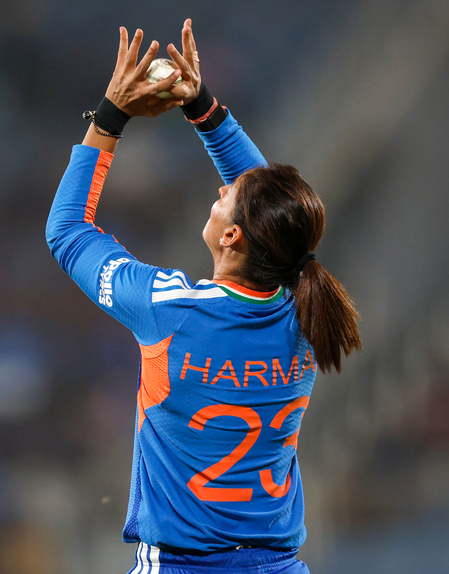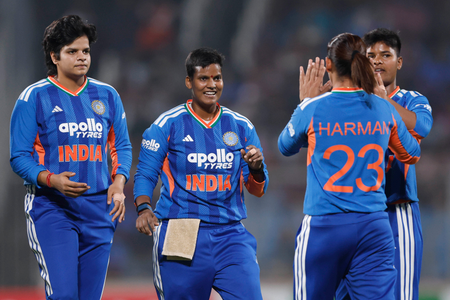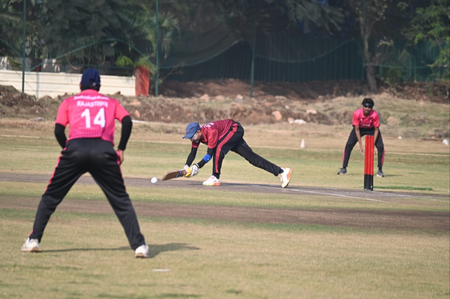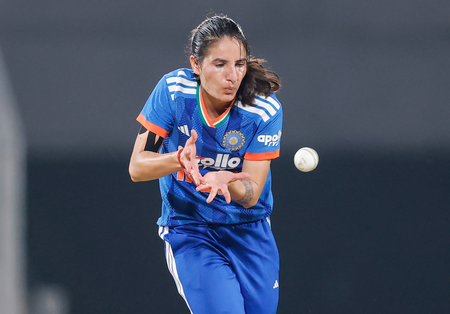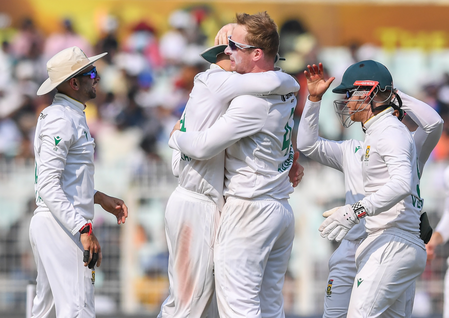
New Delhi, Nov 19 (IANS) Nearly a decade after his Test career suffered a setback on Indian soil, Simon Harmer returned to pick 8-51 – the best figures by a South African spinner in India, and play a key role in the side’s famous 30-run win inside three days at the Eden Gardens in Kolkata.
While picking four-fers in both innings, Harmer captivated all with his control and varying speeds to bamboozle the Indian batters. When Harmer mentioned that Mumbai-based coach Umesh Patwal was behind his turnaround in Tests in the press conference after picking the first of his two four-wicket hauls in Kolkata, the latter’s phone started ringing immediately.
“I never doubted this. I knew from the time he played Tests against Pakistan, he was going to be amazing. Once I heard the news (of his four-for in the first innings), I would normally go and watch it at night.”
“But that day I started getting calls after he mentioned me in the press conference. So I had to go and see him bowl via streaming. He’s amazing and has great control. What we had spoken about a few years back, he’s almost there now,” Patwal said in a free-wheeling chat with IANS.
The seeds of Harmer having an outing to remember in Kolkata were sowed nine years ago in India, through an intense 10-day workshop in Mumbai where he unlearnt all things spin bowling and rebuilt his game from scratch under Patwal’s guidance.
Harmer had first met Patwal in May 2015 during a Cricket South Africa (CSA) spin camp in India, where the latter was Director of Cricket at Global Cricket School. But after picking only five wickets in two Tests in India, Harmer was overlooked for series against England and New Zealand, leaving his international career at a crossroads.
In September 2016, Harmer flew to Mumbai for a 10-day intensive spin bowling training at Patwal’s iThinkSportz Academy. Patwal, who worked as Afghanistan’s batting coach and also coached Nepal, recalled that Harmer’s frustration for the first two days stemmed not from learning new techniques, but from the need to discard long-held beliefs.
“The first two days were more difficult for him because he had to unlearn whatever he had done while playing Tests, because the theory and the concept which I bring is not very conventional and orthodox. For him to accept that took two days, which were very frustrating and was reduced to tears.”
“Frustration starts when you know that you are good at something and you can do it. His frustration was knowing that this is something which can take me to the next level. So why is it taking time for me to accept that?” he said.
Patwal’s coaching philosophy challenges traditional spin bowling techniques at every turn. The first lesson was about grip – Patwal realized Harmer was using his palm too much and gripping the ball too hard. He made him use the thumb more instead.
The theory was simple – using much of your thumb on the ball is helpful as more surface area on the ball equals more revolutions. Another lesson Harmer learnt from Patwal was that gripping the ball too tightly often reduces an off-spinner’s control and effectiveness.
Instead, a relaxed hand and lighter grip allows bowlers to generate more revolutions, similar to how a batter needs loose arms to swing freely. It’s like while driving the car, people are told not to hold the steering of the car tightly, as it affects one’s manoeuvrability.
“It’s a cycle – one, two, three, and four. Usually, it is not pivoting, not going on the toe as often and like finish is not the most important part and not to use the thumb. Everything was opposite – so you have to use the thumb. You have to be on your whole feet when you are delivering the ball.”
“You need to go more forward than pivoting or twisting and more about being relaxed than actually worrying about the finish. So if you look at all the sentences which I have used, nothing is in the traditional coaching style,” he said.
Apart from their sessions happening from 7am to 7pm for ten days without a break, Patwal ensured chats with Harmer had leadership development and perspectives on life. “We would start from morning – have breakfast together and discuss what are the things that took him so much time to understand. Then we went into the session for 3-4 hours and after that, sit down for lunch again.”
“We would talk about not just bowling – discussion on personal life characteristics also happened. It was about what leaders and best cricketers do, who are the topmost performers and why they are match winners. All these things matter more – then you come back and do the skill work again because at this age, you don’t teach them.”
“Instead, you make them understand why that skill is so important for him to understand what is bowling – the spin, turn, bounce and pace. We would have dinner together and then we would go back to our respective places. That’s how we had those long days – not just cricket, but talking about life’s perspectives too,” he explained.
Harmer also explored Mahavir Nagar, where he would indulge in eating vada pav, chicken tikka masala and Gujarati cuisine. He also visited two local schools and interacted with players and children there.
Central to Patwal’s coaching was also instilling leadership qualities and seeing Harmer’s mindset shift from personal statistics to match-winning contributions. “It’s not about just developing a bowler. I think it’s more about leadership qualities and he does have a lot of that. It really helped him because if you say that you want to be the best without being a leader, you cannot be the best.”
“So we needed to explore that part. We spoke about how he can be the best bowler without not being a leader. For us, a leader means you don’t have to lead the team – you have to lead yourself first and that’s the best thing about him.”
“He actually has that leadership quality and when he walked up to Bavuma and said that I still want to play for South Africa, it shows that he is someone who can break all the boundaries. So that personality of his is amazing – he’s a person who just respects everyone around him as well,” he said.
That philosophy has stayed with Harmer throughout his resurgence in Tests. His words from Kolkata after getting Player of the Match award – ‘I am not a statsman, I am a win-man’, left Patwal delighted. “I got a message from him for his man of the match award. He puts me as Umesh bhai and his message was, ‘Umesh bhai, thank you’. I mean, it’s just amazing.”
“I remember that’s what we spoke in those 10 days in Mumbai. When you are bowling, it’s not about you taking wickets – it’s about winning matches and that’s been his biggest asset. It makes me really happy that we have stuck to the same thing done from those 10 days.”
The relationship between Patwal and Harmer extended beyond those initial 10 days. They had follow-up sessions in Abu Dhabi, where Essex had a pre-season camp, and Chelmsford, England.
“He called me to Abu Dhabi and put me in a seven-star hotel, so that shows the big heart he has. While the Essex team were training in a couple of nets, me and him were training individually, and we had a couple of sessions till Covid-19 arrived. Then I was in England for one couple of days. So he called me to Chelmsford where we did one session with white ball as well.”
Currently serving as head coach of the Assam U23 men’s team in Vadodara, Patwal won’t be able to meet Harmer in Guwahati, the venue for the second Test starting on Saturday, due to his current and few more commitments. But he signed off by explaining what young cricketers can learn from Harmer’s journey of rebuilding his game to thriving due to the lessons learnt from those ten days in Mumbai.
“It’s about trusting your belief. There is no such thing like you have to bowl the same way. If Simon Harmer is bowling one way, it’s not that you have to bowl like him. You need to understand what’s his strength and that belief is something which you can take from Simon Harmer. Just as a bowler you can take anything from him.”
“Plus, the trust that he wants to come back and play for South Africa – no, he wanted to come back and win matches for South Africa – that’s what made him play international cricket again. So boys who are playing should not worry about playing for India, and Bombay.”
“They should think about trying to win matches for their state or country and not just think about playing games. That’s the biggest thing one can take from Simon Harmer, as a player, and a person for all the youngsters – not just go to play for themselves, but win games.”
–IANS
nr/

